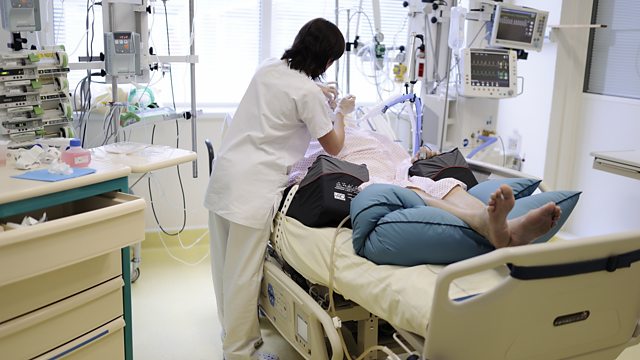Switching Off the Noisy Alarms in Hospitals Which Don’t Aid Recovery
Noisy alarms on some hospital wards can reach 60 decibels – equivalent to a busy restaurant. Researchers say alternatives to alarms can help to quieten things down.
The noise of alarms on some hospital wards can reach 60 decibels – the equivalent to a busy restaurant – not the ideal environment for sick patients. Up to 90% of the alarms are ignored by staff anyway because they aren’t critical to the patient’s care. Not terribly restful. But for the fourth year in a row, the American patient safety organisation the ECRI has put alarm hazards top of its list of issues. In the UK, researchers at Oxford University have analysed interviews with patients for the Health Talk website and found that alarms came up again and again as a problem for patients. Julie Darbyshire who researches noise in hospitals and Lisa Hinton from the Health Experiences Research Group are both acutely aware of the stress which a noisy environment causes for patients. Lisa has a particular interest in reducing the noise – as she herself was a patient on an intensive care ward a few years ago. Changes are coming – pagers are used instead of alarms next to patients and alarms which light up instead of making a noise.
Ramadan has just begun and means observing a fast during daylight hours for many Muslims. In the Middle East this means no food or drink for roughly fifteen hours. But further north the timing of Ramadan this year means fasting for up to 21 hours a day – the longest in 33 years. In the Finnish capital Helsinki people can break their fast just before 11 in the evening, then have just a few hours to load up with calories, get some sleep, be up for prayers, and maybe eat some more food – all before the sun rises just before 4 am. The medical difficulties have been well-researched and pregnant women, people with chronic health problems and young children do have exemptions. Some of the people at the city’s mosque for prayers said that they felt inspired to fast but others knew of fellow Muslims who had stopped fasting because of the long daylight hours.
James Gallagher reports from the American Society of Clinical Oncology conference in Chicago on cancer research. Right-handed bowel cancer is commoner in African American patients and doesn’t respond to treatment as well as cancer found on the other side of the colon. Advice for African American patients includes having bowel screening from the age of 45 – five years earlier than other patients. Another landmark study revealed that taking hormonal drugs for up to 15 years reduces the risk of breast cancers coming back.
Depression is one of those topics that many people still find very difficult to discuss openly. Around the world all sorts of groups of people have come up with unusual ways of opening up a dialogue, including the Depressed Cake Shop where the cakes are grey in colour, but often brightly-coloured on the inside. They offer online support too. One of the early founders Val Van Gelder is based in Los Angeles and has only linked up with other members such as Jules in Scotland on the internet. She’s been delighted by the impact of the cake shops which happen all over the world. Another Depressed Cake Shop member Freda used to be a teacher and a professional counsellor. She became involved after her daughter Evie developed depression and eventually killed herself. Freda sees depression as a greyness which covers what may be a colourful and vibrant life.
There’s also news of a blood test to check if specific antidepressants work in individual patients – which could offer more targeted, quicker treatments.
Photo credit: Getty Images
Last on
Broadcasts
- Wed 8 Jun 2016 21:32GMTΒι¶ΉΤΌΕΔ World Service except East and Southern Africa & News Internet
- Thu 9 Jun 2016 01:32GMTΒι¶ΉΤΌΕΔ World Service Americas and the Caribbean
- Thu 9 Jun 2016 02:32GMTΒι¶ΉΤΌΕΔ World Service Online, Europe and the Middle East & UK DAB/Freeview only
- Thu 9 Jun 2016 03:32GMTΒι¶ΉΤΌΕΔ World Service East Asia & South Asia only
- Thu 9 Jun 2016 04:32GMTΒι¶ΉΤΌΕΔ World Service Australasia
- Thu 9 Jun 2016 06:32GMTΒι¶ΉΤΌΕΔ World Service East and Southern Africa & Europe and the Middle East only
- Thu 9 Jun 2016 14:32GMTΒι¶ΉΤΌΕΔ World Service except News Internet
- Sun 12 Jun 2016 19:32GMTΒι¶ΉΤΌΕΔ World Service East and Southern Africa
Podcast
-
![]()
Health Check
Health issues and medical breakthroughs from around the world.


